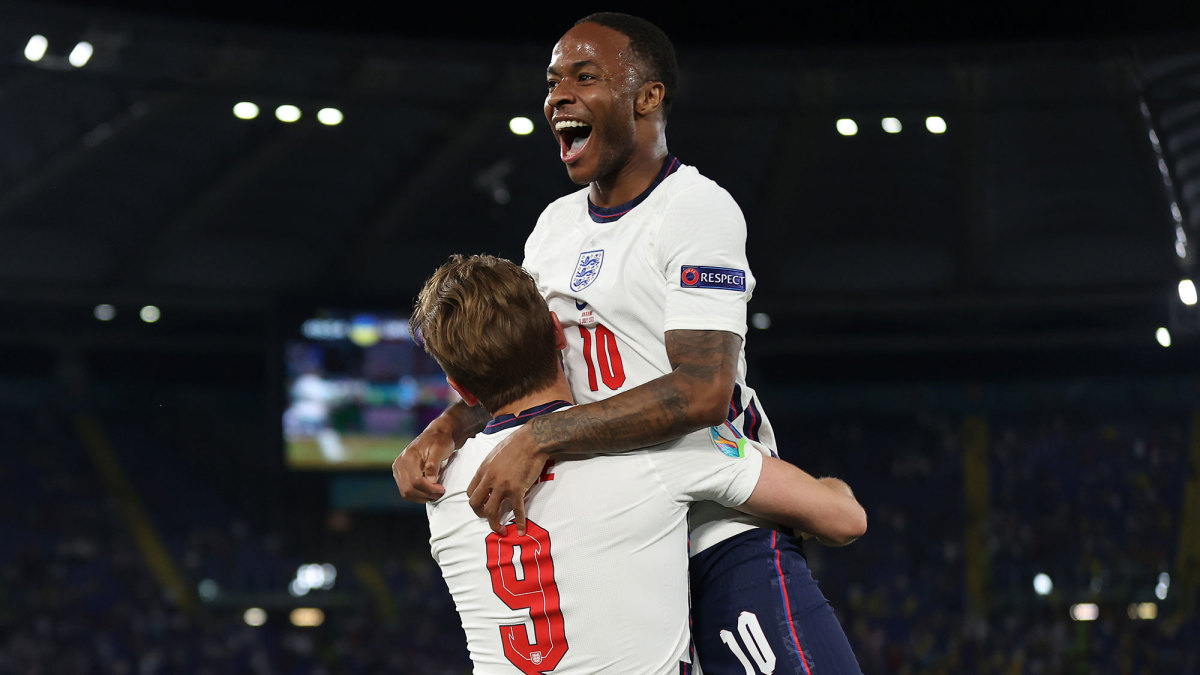England's Raheem Sterling, Harry Kane Rise Above the Discourse
Life in tournaments moves pretty fast. Watching Raheem Sterling and Harry Kane shredding Ukraine and Denmark in the quarterfinals and semifinals of the Euros, it was hard to imagine that when the tournament began less than a month ago, there were doubts over Sterling’s place in the team and grumbles over Kane’s form. If England goes on to beat Italy in Sunday’s final, there’s every chance Kane could lift the Golden Boot and Sterling the Golden Ball.
The concerns over Sterling are perhaps the more complicated ones, if only because of the tendency of modern discourse to bifurcate into tedious culture wars. Sterling, having been hailed as the rising star of English football heading into the 2014 World Cup, was widely scapegoated after the defeat to Iceland in Euro 2016, with various tabloids running frankly ludicrous hit pieces about the fancy bathroom in the house he had bought for his mother.
Much of it was classic media bullying—a few weeks after being denounced for his “bling” taste in home furnishings, he was condemned for being a cheapskate by taking a flight on a budget airline—and some of it was couched in terms that seemed fairly obviously racist. There was a backlash against that and so discussion around Sterling for a time rapidly coalesced into camps that were for or against him, heightened by the backdrop of the Brexit referendum, by which the U.K. voted to leave the European Union three days before defeat to Iceland.
All of which made any realistic footballing assessment of Sterling almost impossible. He is an exceptionally gifted player, but occasionally when out of form his decision-making lets him down and he wastes decent shooting or crossing opportunities. His form over the past five years has been very good, but in the final two months of this club season he suffered a wobble—to which he made cryptic reference after England’s opening game of the Euros, referring obliquely to “reasons” for the downturn without elaborating. After Manchester City’s defeat to Manchester United on March 7, Sterling started only five of City’s remaining league and Champions League games of the season, and three of those were the final three league games when, with the title won, City was resting players for the Champions League final.
Again, it was possible to wonder, given England’s attacking riches, whether Sterling was really worth his place in the starting lineup. But Gareth Southgate, who has the benefit of seeing players in training, remained loyal, and has been richly rewarded. Sterling scored England’s only two goals in the group stage, and his rapid and incisive dribbling was critical to the wins over Ukraine and Denmark. It was his persistent pressure that ultimately won the decisive, if not controversial, penalty in extra time vs. the Danes in the semis. The now notorious question he was asked after the Croatia game about whether he had justified his place in the side—which at the time seemed a little abruptly phrased but was essentially warranted—looks absurd in retrospect.
Kane, meanwhile, is perhaps just a player who needs games to find his rhythm. He has only ever scored four league goals in August, had a dreadful Euros in 2016 and, although he did win the Golden Boot in Russia in '18, was nowhere near his best in that World Cup, the majority of those goals coming from penalties or corners, and all but one in the group stage. After a slow start this time, he has four goals in his last three games, while no England player has ever scored more in knockout games at major tournaments.
Here, he looked leggy in the group, lacking sharpness and speed, and struggled to get involved. Had England had a like-for-like alternative, or had Kane not been captain, he may have been dropped. But as England has improved so has he. His plunging header against Germany seemed to flick a switch. Suddenly he had confidence and looked fluent again. He scored twice against Ukraine with fine finishes, and nearly had another with a brilliant dipping volley with his weaker left foot. Then against Denmark, although his goal was a rebound after a dreadful penalty—he struck his shot so badly it seemed to confuse Kasper Schmeichel into just patting back where it had come from—he was a constant threat dropping deep and feeding Bukayo Saka and Sterling. The first goal was a result of Saka's cross following Kane's defense-splitting pass.
Tournaments are, by their nature, hysterical. Even in this bloated age, they are only, for the teams that reach the final, seven games long. Every game matters. Every game is subjected to far more intense scrutiny than in a club campaign of 38 league games, plus perhaps 13 Champions League games and another handful in the domestic cups. Judgments are made hastily. Everybody wants utopia now.
Football is rarely a patient sport, and in international tournaments it is at its most impatient. But players, as Sterling and Kane demonstrate, can grow into tournaments.
More Euro 2020 Coverage:







